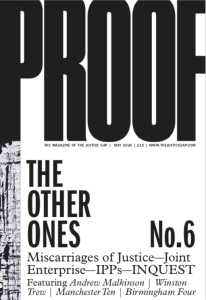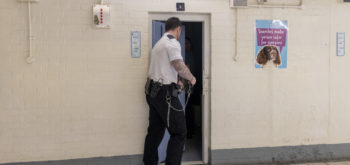Prisoners maintaining their innocence face ‘insurmountable obstacles’ trying to clear their names and had ‘lost faith’ in the justice system, according to a new study published today. The report makes recommendations to scrap the 28-day time limit for appeals to the Court of Appeal, make court transcripts available for those making appeals and to properly fund the troubled miscarriage of justice watchdog. Illustration: Patrick Maguire.
 The study found that legal aid cuts and a lack of support for applications to the Criminal Cases Review Commission (CCRC) was leaving ‘many without the help they need to challenge wrongful convictions’. The study draws on interviews with 49 people—some currently in prison, others released—who had either considered making or made an application to appeal and/or an application to the CCRC. Many said they struggled to find a lawyer willing to help, especially from inside prison. Some didn’t know that legal aid might be available, while others said that it wasn’t enough to fund the support they needed.
The study found that legal aid cuts and a lack of support for applications to the Criminal Cases Review Commission (CCRC) was leaving ‘many without the help they need to challenge wrongful convictions’. The study draws on interviews with 49 people—some currently in prison, others released—who had either considered making or made an application to appeal and/or an application to the CCRC. Many said they struggled to find a lawyer willing to help, especially from inside prison. Some didn’t know that legal aid might be available, while others said that it wasn’t enough to fund the support they needed.
‘Our research shows that people who maintain their innocence often face insurmountable obstacles in seeking to clear their names,’ commented Dr Lucy Welsh, Reader in Criminal Justice at the University of Sussex and lead author of the report. ‘In the face of complicated processes and problems with communication, many people lose hope. The justice system must do more to ensure that everyone—regardless of their means or background—can access a fair route to challenge their conviction.’ The report was written with Dr Amy Hughes of Brighton University.
Several participants said they had resorted to teaching themselves the law or relied on help from fellow prisoners. Those with mental health conditions or learning difficulties found it particularly hard to navigate the system without proper support. Some people who applied to the CCRC described it as slow, unclear and unresponsive. Many felt their cases had not been properly investigated and said they no longer trusted the justice system to work fairly.
According to the research, the data indicated ‘that people had lost faith in the criminal justice system’. ‘The CCRC is – as the organisation of last resort, and with a test which defers to the decision making of the CoA – in a difficult position in terms of the prospective applicant population,’ the authors said.
One theme was the scarcity of decent legal advice and its huge cost. According to one prisoner: ‘I contacted 51 solicitor’s firms, most of which advertise CCRC applications. I received four replies. One wanted £3,800 just to look at the papers to decide. Three others replied saying they couldn’t help because of their workload. 47, not a single reply, nothing. Not even an acknowledgement to say, ‘we can’t help you.’’
Another said: ‘Lots of people that I met in prison had spent up to half a million quid on trying to clear their name. It blew my mind. […] I think I’m sensible enough to go, what are the odds here? What’s the point in that?’ One prisoner claimed to have spent over a million pounds on fighting to clear their name.
These ‘cost implications’ (including the expense of transcripts, evidence and investigation) meant that six of the interviewees claimed that they were unable to pursue an appeal or application to the CCRC.
Ten interviewees had been able to find some sort of pro bono help – one reported his a barrister submitted an application to the CCRC. ‘[He did that work] without charging [….] But he, I believe, expended a great deal of money himself, it may have been in the order of £20,000 odd trying to help. Because I had no legal aid.’
‘Perhaps unsurprisingly’, the researchers noted, given that most of those participants who had applied to the CCRC had been unsuccessful in having their conviction quashed, people generally expressed negative opinions about the CCRC. All 35 of the participants who had applied to the CCRC expressed concerns or dissatisfaction and 14 described the CCRC as being unfit for purpose. The CCRC was variously described as ‘dismissive’, ‘self- serving’, ‘lacking credibility’, ‘ill-equipped and underfunded’, and ‘partial’ in letters written to the researchers. ‘Many of these sentiments were echoed during interviews during which the CCRC was variously described as uninterested, close-minded, and ‘not fit for purpose’,’ the researchers continued. ‘As participants came to understand the CCRC in this way, they often described an impact on their mental health in terms of lost hope.’
‘I found the CCRC about as effective as a chocolate fireguard. […] [I]f someone said to me is the CCRC the right route to go down I would say no, but it’s your only route to go down that’s the problem.’
‘If they’re not doing their job, it doesn’t matter what you put, what evidence you get if it doesn’t go anywhere, and that’s the problem […] [T]hen you try to speak to the CCRC about it. They’ve got no interest […] you’ve got no recourse, it just stops dead. […] Every time a miscarriage of justice comes up, it’s in the limelight for a couple of weeks and then it’s hidden.’
Recommendations and Conclusion
In relation to the wider justice system:
- The legislature should significantly extend, if not remove, the 28-day time limit for appealing to the Court of Appeal
- HMCTS should review the costs of providing transcripts and consideration should be given to allowing people who seek to appeal their conviction and/or apply to the CCRC being provided with transcripts for free
In relation to legal representation, we recommend:
- Legal Aid Agency make available a directory of lawyers/organisation providing publicly funded advice and representation.
- MoJ should remove the restriction on obtaining publicly funded second opinion advice on appeal within six months and extend the initial 10-hour Advice and Assistance claim limit.
In relation to the prison system:
- HMPPS should improve the processes by which lawyer/third sector advice organisations telephone numbers can be added as approved telephone numbers for prisoners
- Accessible information should be provided at reception post-conviction for people maintaining innocence
- Ensuring consistent access to up to date information about appeals and the CCRC, and consistent access to the resources necessary to make an appeal, including library books, information DVDs, and Offender Managers who have received some training about appeals and the CCRC
In relation to the CCRC:
- The organisation’s funding should be increased.
- The CCRC should hold bi-annual workshops in prisons for people with applications under ongoing review to explain processes and answer procedural questions.
- The legislature should reform the statutory test for referral into something that is more readily understood by potential applicants. Whether the test remains the same or a new test is devised, there is a clear need for the CCRC to provide easy-to-follow guidance and examples about the meaning of the test used for referral of a case to the CoA.
- The CCRC should be more willing to challenge the CoA’s decision making and willing to accept a lower rate at which convictions/sentences are quashed following a referral.
‘Overall, our data indicate that people had lost faith in the criminal justice system, and were, therefore, approaching appeals and the CCRC from experiences which undermined their ability to trust that they would be listened to and have their concerns fully investigated. The CCRC is – as the organisation of last resort, and with a test which defers to the decision making of the CoA – in a difficult position in terms of the prospective applicant population. This increases both the importance of the organisation having the resources to engage fully with applicants, and the importance of people maintaining innocence being able to engage with lawyers who can provide reliable information and advice.’
Support the Justice Gap, buy PROOF







